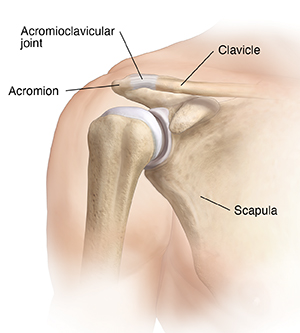Understanding AC Joint Sprain
The AC (acromioclavicular) joint is where the shoulder blade (scapula) meets the collarbone (clavicle). The highest point of the shoulder blade is called the acromion. Strong tissues called ligaments connect the acromion to the collarbone, forming the AC joint.
An AC joint sprain occurs when an injury damages the ligaments in the AC joint.

What causes an AC joint sprain?
Often an accident or injury forces the AC joint apart. This may include:
-
Falling onto your shoulder
-
Falling onto an outstretched hand
-
Getting a direct blow to your shoulder
Symptoms of AC joint sprain
Symptoms can vary depending on how serious the injury is. They can include:
-
Shoulder pain
-
Shoulder that feels sore when touched
-
Swelling
-
Bruising
-
Change in the shoulder’s shape
-
Bulge above the shoulder
-
Shoulder that appears to droop
-
Collarbone that moves upward
-
Limited movement in the shoulder
Treatment for AC joint sprain
Treatment will depend on how serious the strain is. It will also depend on whether you have damage to other parts of the shoulder. Treatment may include:
-
Rest. This allows your shoulder to heal. You should avoid activities that stress the joint. This includes reaching overhead or sleeping on your shoulder.
-
Sling. This protects the shoulder and holds the joint in a good position for healing.
-
Cold packs. These help reduce swelling and relieve pain.
-
Prescription or over-the-counter medicines. These help relieve pain and swelling.
-
Arm and shoulder exercises. These help keep the shoulder joint mobile as it heals. They also help improve muscle strength around the joint.
When to call your healthcare provider
Call your healthcare provider right away if you have any of these:
-
Fever of 100.4°F (38°C) or higher, or as directed by your provider
-
Chills
-
Symptoms that don’t get better or get worse
-
New symptoms
Online Medical Reviewer:
Raymond Turley Jr PA-C
Online Medical Reviewer:
Stacey Wojcik MBA BSN RN
Online Medical Reviewer:
Thomas N Joseph MD
Date Last Reviewed:
11/1/2022
© 2000-2025 The StayWell Company, LLC. All rights reserved. This information is not intended as a substitute for professional medical care. Always follow your healthcare professional's instructions.